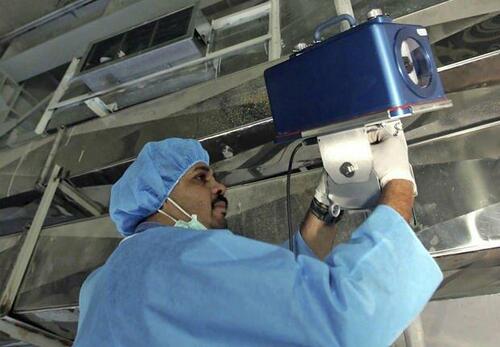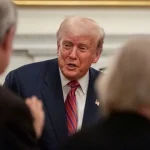
The International Atomic Energy Agency’s Board of Governors has voted to formally censure Iran over a series of breaches related to inspections, most notably that unexplained traces of unenriched uranium have been found in at least two undeclared sites over a period of years.
The 35-nation passed the resolution with a 30 to 2 vote on Wednesday (with a few abstentions). Notably Russia and China opposed the measure, which said the following according to Reuters:
The text says the board "expresses profound concern" the traces remain unexplained due to insufficient cooperation by Iran and calls on Iran to engage with the watchdog "without delay".

It comes after Iran last month turned over paper work which Tehran says adequately explains the breaches, but the IAEA has said it remains unsatisfied by this.
However, the agency has said Iran's actions are fueling "distrust" and that it sees no proper civilian nuclear power application at this point:
They said Iran’s possession of 60 percent enriched uranium, in addition to deploying 2,000 advanced centrifuges and expanded research and development, is cause for great concern and is "fueling distrust as to Iran’s intentions".
The Islamic Republic appears to have responded to the censure by further drastically reducing its cooperation. First, just ahead of the vote Al Jazeera reported, "The Atomic Energy Organization of Iran (AEOI) announced on Wednesday that it has turned off the Online Enrichment Monitor (OLEM) and flowmeter system of the International Atomic Energy Agency (IAEA) at an unidentified nuclear site."
And following the formal IAEA rebuke, the UN nuclear watchdog says it was informed that "Iran plans to install two new cascades of advanced centrifuges that will allow Tehran to rapidly enrich more uranium."
These will reportedly be added at the Natanz nuclear facility, south of Tehran. The AP details: "An IR-6 centrifuge spins uranium 10 times as fast as the first-generation centrifuges that Iran was once limited to under its 2015 nuclear deal with world powers. As of February, Iran already had been spinning a cascade of IR-6s at its underground facility at Fordo, according to the IAEA." At the same time Iran has reportedly switched off a number of UN monitoring cameras at various sites.
There's consensus among Iran watchers that the country currently has enriched enough uranium of to 60% purity to be able to shortly bring it up to weapons-grade levels of 90% if Tehran chose to do so. 90% purity must be attained to produce a nuclear weapon. Experts say Iran likely is close enough to produce one bomb in a short time frame if it set out.
All of this of course will derail already stalled Vienna nuclear talks further. Meetings haven't occurred for months, with the Iranians blaming Washington, after the parties returned to their respective capitals. One key issue that's remained is removing Iran's IRGC from the US official terror list. Iran has said this would be key to finalizing a deal, which the Biden White House has so far declared it's not willing to do without the Iranians first taking more action.
Iran's President Ebrahim Raisi followed on Thursday by vowing that Iran "will not back off a single step from its positions" following the largely just symbolic IAEA resolution, according to state media.
The International Atomic Energy Agency’s Board of Governors has voted to formally censure Iran over a series of breaches related to inspections, most notably that unexplained traces of unenriched uranium have been found in at least two undeclared sites over a period of years.
The 35-nation passed the resolution with a 30 to 2 vote on Wednesday (with a few abstentions). Notably Russia and China opposed the measure, which said the following according to Reuters:
The text says the board “expresses profound concern” the traces remain unexplained due to insufficient cooperation by Iran and calls on Iran to engage with the watchdog “without delay”.

It comes after Iran last month turned over paper work which Tehran says adequately explains the breaches, but the IAEA has said it remains unsatisfied by this.
However, the agency has said Iran’s actions are fueling “distrust” and that it sees no proper civilian nuclear power application at this point:
They said Iran’s possession of 60 percent enriched uranium, in addition to deploying 2,000 advanced centrifuges and expanded research and development, is cause for great concern and is “fueling distrust as to Iran’s intentions”.
The Islamic Republic appears to have responded to the censure by further drastically reducing its cooperation. First, just ahead of the vote Al Jazeera reported, “The Atomic Energy Organization of Iran (AEOI) announced on Wednesday that it has turned off the Online Enrichment Monitor (OLEM) and flowmeter system of the International Atomic Energy Agency (IAEA) at an unidentified nuclear site.”
And following the formal IAEA rebuke, the UN nuclear watchdog says it was informed that “Iran plans to install two new cascades of advanced centrifuges that will allow Tehran to rapidly enrich more uranium.”
These will reportedly be added at the Natanz nuclear facility, south of Tehran. The AP details: “An IR-6 centrifuge spins uranium 10 times as fast as the first-generation centrifuges that Iran was once limited to under its 2015 nuclear deal with world powers. As of February, Iran already had been spinning a cascade of IR-6s at its underground facility at Fordo, according to the IAEA.” At the same time Iran has reportedly switched off a number of UN monitoring cameras at various sites.
There’s consensus among Iran watchers that the country currently has enriched enough uranium of to 60% purity to be able to shortly bring it up to weapons-grade levels of 90% if Tehran chose to do so. 90% purity must be attained to produce a nuclear weapon. Experts say Iran likely is close enough to produce one bomb in a short time frame if it set out.
All of this of course will derail already stalled Vienna nuclear talks further. Meetings haven’t occurred for months, with the Iranians blaming Washington, after the parties returned to their respective capitals. One key issue that’s remained is removing Iran’s IRGC from the US official terror list. Iran has said this would be key to finalizing a deal, which the Biden White House has so far declared it’s not willing to do without the Iranians first taking more action.
Iran’s President Ebrahim Raisi followed on Thursday by vowing that Iran “will not back off a single step from its positions” following the largely just symbolic IAEA resolution, according to state media.




